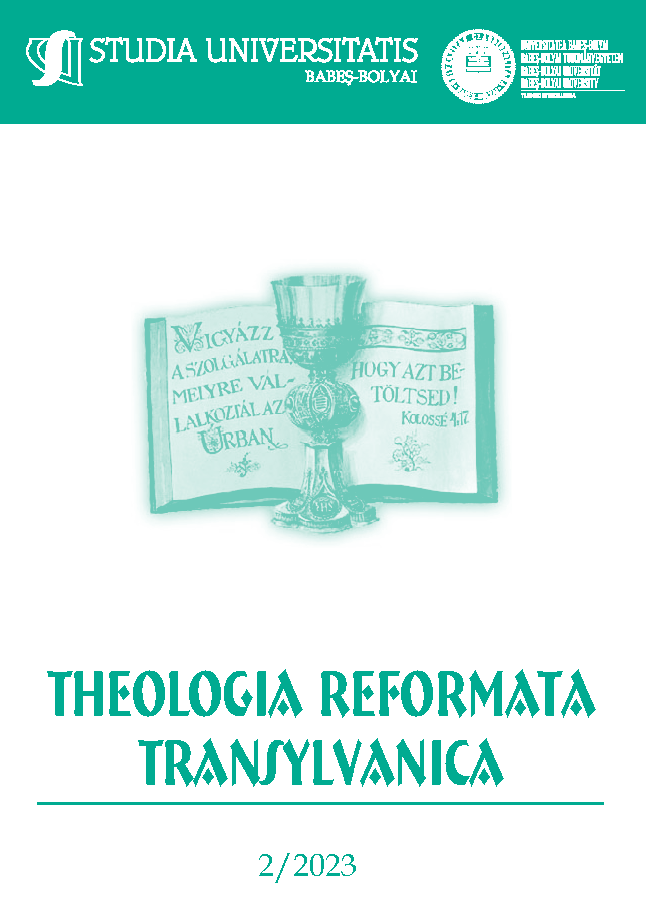Praxis pietatis, avagy a kegyesség gyakorlata. Hit és cselekedet kapcsolata az Újszövetségben – egy hatástörténeti csomópontból nézve
DOI:
https://doi.org/10.24193/subbtref.68.2.01Keywords:
faith and deeds, New Testament, justification, Joint Declaration, social justice, ChrysostomAbstract
Praxis Pietatis, or the Practice of Piety: The Relationship between Faith and Deeds in the New Testament ─ From the Perspective
of a Historical Impact Point
This article delves into the intricate relationship between faith and deeds as it pertains to the teachings of the New Testament, drawing from the legacy of the Reformation. It emphasizes the necessity of re-evaluating church doctrine based on the foundation of the Scripture. However, it recognizes that understanding the message of the Scripture is not an objective, detached process but rather one that is deeply entwined with individual religious experiences and interpretations. The dynamic interaction between faith and the tangible, visible world shapes our comprehension of the Bible’s words and meanings.
The complex interplay of faith and deeds is recognized, as various denominations stress different aspects of biblical teachings. The role of faith in the New Testament is not solely to lead to salvation; it also establishes a framework for the believer’s relationship with good deeds, setting it within a temporal framework. The New Testament understanding of salvation, whether it is eternal life or the acquisition of God’s kingdom, is framed by the faith of God’s chosen people, and this faith presupposes the intervention of God. Thus, faith cannot be separated from God’s action, making it the foundation for understanding good deeds.
References
BILLINGS, J. Todd (2008): Calvin, Participation, and the Gift: The Activity of Believers in Union with Christ. New York, Oxford University Press.
DUNN, James D. G. – SUGGATE, Alan M. (1994): The Justice of God: A Fresh Look at the Old Doctrine of Justification by Faith. Michigan, Eerdmanns.
LANE, Anthony N. S. (2006): Justification by Faith in Catholic-Protestant Dialogue. London – New York, Bloomsbury T&T Clark.
MURRAY, John (2022): The Epistle to the Romans. Westminster Seminary Press.
PARSONS, Michael (szerk.) (2012): Since We Are Justified by Faith. Justification in the Theologies of the Protestant Reformation. Milton Keynes, Paternoster.
STUHLMACHER, Peter (2017): Az Újszövetség bibliai teológiája 1. Alapvetés. Jézustól Pálig. Budapest, Kálvin Kiadó.
Hivatkozott művek
CHRYSOSTOMUS: De proditione Judae, In: Migne, J. P. (szerk.): Patrologia Graeca. 49. 373–392.
Homiliae in Epistulam I ad Corinthos, In: Migne, J. P. (szerk.): Patrologia Graeca. 61. 9–382.
Homiliae in Epistulam ii ad Corinthos, In: Migne, J. P. (szerk.): Patrologia Graeca. 61. 381–610.
Homiliae in Mattheum, In: Migne, J. P. (szerk.): Patrologia Graeca. 58.
KÁLVIN János (2014): Institutio I–II. A keresztyén vallás rendszere. Budapest, Kálvin Kiadó.
Joint Declaration on the Doctrine of Justification. (1999). http://www.christianunity.va/content/unitacristiani/en/dialoghi/sezione-occidentale/luterani/dialogo/documenti-di-dialogo/1999-dichiarazione-congiunta-sulla-dottrina-della-giustificazion/en.html (letöltés: 2023.10.15). Magyarul: „Közös Nyilatkozat a megigazulás tanításáról”, In: Az evangélikus – római katolikus Közös Nyilatkozat a megigazulás tanításáról és ünnepélyes aláírásának dokumentumai. Fordította Hafenscher Károly – Kránitz Mihály – Puskás Attila – Reuss András [Vincze Katalin]. Budapest, Evangélikus Sajtóosztály – Szent István Társulat 2000. 7–29.
MEDGYESI Pál (1636): Praxis pietatis. Debrecen [A reformáció és ellenreformáció korának evangéliumi keresztyén (református és evangélikus) egyházi írói IV. Szerk.: dr. Incze Gábor. Budapest, 1936].
Downloads
Published
How to Cite
Issue
Section
License
Copyright (c) 2023 Studia Universitatis Babeș-Bolyai Theologia Reformata Transylvanica

This work is licensed under a Creative Commons Attribution-NonCommercial-NoDerivatives 4.0 International License.






